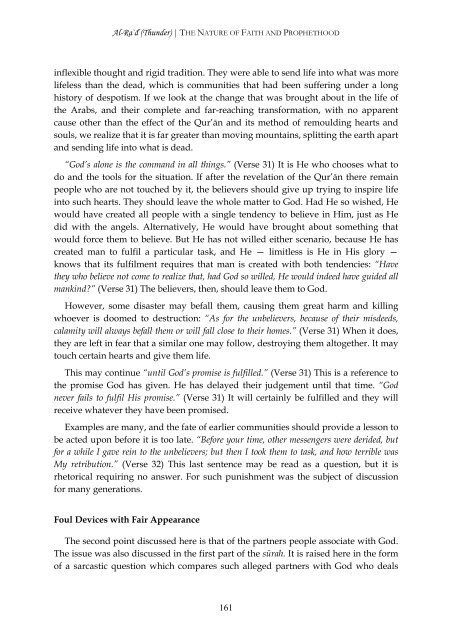Volume 10 Surah 12 - 15 - Enjoy Islam
Volume 10 Surah 12 - 15 - Enjoy Islam
Volume 10 Surah 12 - 15 - Enjoy Islam
You also want an ePaper? Increase the reach of your titles
YUMPU automatically turns print PDFs into web optimized ePapers that Google loves.
Al-Ra`đ (Thunder) | THE NATURE OF FAITH AND PROPHETHOOD<br />
inflexible thought and rigid tradition. They were able to send life into what was more<br />
lifeless than the dead, which is communities that had been suffering under a long<br />
history of despotism. If we look at the change that was brought about in the life of<br />
the Arabs, and their complete and far-reaching transformation, with no apparent<br />
cause other than the effect of the Qur’ān and its method of remoulding hearts and<br />
souls, we realize that it is far greater than moving mountains, splitting the earth apart<br />
and sending life into what is dead.<br />
“God’s alone is the command in all things.” (Verse 31) It is He who chooses what to<br />
do and the tools for the situation. If after the revelation of the Qur’ān there remain<br />
people who are not touched by it, the believers should give up trying to inspire life<br />
into such hearts. They should leave the whole matter to God. Had He so wished, He<br />
would have created all people with a single tendency to believe in Him, just as He<br />
did with the angels. Alternatively, He would have brought about something that<br />
would force them to believe. But He has not willed either scenario, because He has<br />
created man to fulfil a particular task, and He — limitless is He in His glory —<br />
knows that its fulfilment requires that man is created with both tendencies: “Have<br />
they who believe not come to realize that, had God so willed, He would indeed have guided all<br />
mankind?” (Verse 31) The believers, then, should leave them to God.<br />
However, some disaster may befall them, causing them great harm and killing<br />
whoever is doomed to destruction: “As for the unbelievers, because of their misdeeds,<br />
calamity will always befall them or will fall close to their homes.” (Verse 31) When it does,<br />
they are left in fear that a similar one may follow, destroying them altogether. It may<br />
touch certain hearts and give them life.<br />
This may continue “until God’s promise is fulfilled.” (Verse 31) This is a reference to<br />
the promise God has given. He has delayed their judgement until that time. “God<br />
never fails to fulfil His promise.” (Verse 31) It will certainly be fulfilled and they will<br />
receive whatever they have been promised.<br />
Examples are many, and the fate of earlier communities should provide a lesson to<br />
be acted upon before it is too late. “Before your time, other messengers were derided, but<br />
for a while I gave rein to the unbelievers; but then I took them to task, and how terrible was<br />
My retribution.” (Verse 32) This last sentence may be read as a question, but it is<br />
rhetorical requiring no answer. For such punishment was the subject of discussion<br />
for many generations.<br />
Foul Devices with Fair Appearance<br />
The second point discussed here is that of the partners people associate with God.<br />
The issue was also discussed in the first part of the sūrah. It is raised here in the form<br />
of a sarcastic question which compares such alleged partners with God who deals<br />
161

















